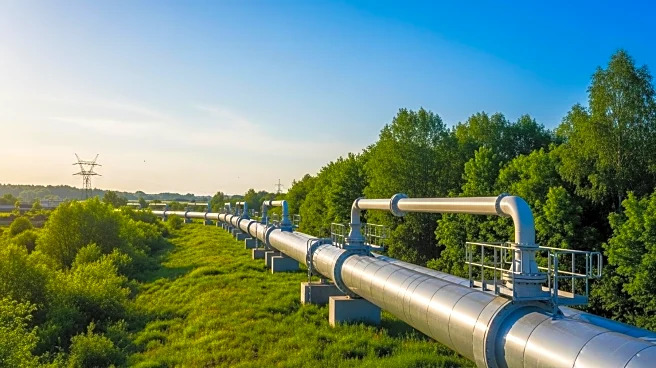What is the story about?
What's Happening?
Industry experts, including Josh Browning from Williams Companies, Inc., have emphasized the growing demand for natural gas as a key component of the U.S. energy supply. At a legislative hearing in Georgia, it was noted that data centers, along with the electrification of transportation and heating, are major drivers of this demand. The U.S. reportedly has at least a century's worth of natural gas reserves, although concerns were raised about the long-term reliance on this fossil fuel. The Tennessee Valley Authority (TVA) also highlighted nuclear power as a crucial future energy source, citing its efficiency compared to renewable sources like solar power.
Why It's Important?
The discussion underscores the ongoing energy transition in the U.S., where natural gas and nuclear power are positioned as pivotal in meeting future energy needs. This shift has significant implications for energy policy, infrastructure investment, and environmental considerations. While natural gas offers a substantial supply, its environmental impact remains a concern. Nuclear power, on the other hand, presents a more land-efficient alternative but comes with its own set of challenges, including safety and waste management. The focus on these energy sources reflects broader trends in balancing economic growth with sustainable energy practices.
What's Next?
The legislative and industry focus on natural gas and nuclear power suggests potential policy shifts and investment in these areas. As data centers continue to expand, their energy demands will likely influence future energy infrastructure developments. The TVA's stance on prioritizing industrial facilities over data centers for energy allocation could shape regional economic strategies. Additionally, the exploration of natural gas reserves in Georgia may lead to new extraction projects, impacting local economies and environmental policies.
Beyond the Headlines
The reliance on natural gas and nuclear power raises ethical and environmental questions about sustainable energy practices. The potential environmental impact of increased natural gas extraction, particularly through fracking, could lead to regulatory challenges. Meanwhile, the debate over nuclear power's role in the energy mix highlights the need for advancements in safety and waste disposal technologies. These developments could influence public perception and policy decisions regarding the U.S. energy landscape.
















